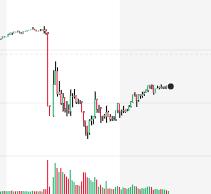
The world got a taste, albeit, a premature taste, of some bad news this afternoon. According to an article in STAT, the results of one of the Chinese trials of Gilead's potential anti-coronavirus remdesivir were mistakenly released early when a draft of a paper (which has since disappeared) appeared on the WHO website. It would be difficult to find much cause for optimism based on the data, even if incomplete, but this does not necessarily mean it's the death knell for the drug.
The stock market seems to have written off remdesivir; the stock dropped sharply on the news, but Gilead still maintained that the data suggest a “potential benefit.” If there is any benefit it is difficult to see any from the results in the draft paper.
Here are some key points, according to the abstract of the draft paper:
- The study was designed to include 453 patients, but only 237 were enrolled.
- (Two other Chinese trials were halted earlier this month when investigators couldn't enroll enough patients.)
- 158 people were given the drug and 79 were not.
- Patients who had been sick for up to 12 days were allowed to join the trial.
- The drug-treated group got IV infusions of remdesivir (it cannot be given as a pill) once a day for a 10-day period.
- The outcomes of the trial were measured on a scale from 1-6, 1 meaning discharge from the hospital, and 6 meaning death.
- In order to be considered a responder a two-point improvement in that score was required.
- There is some confusion about the Hazard ratio (HR) - an important measure of whether the treated group did better or worse than the control group. Normally, a number lower than one means that the treated group did better. If the HR is 0.5 this means a 50% improvement.
- The HR was given as 1.23, meaning that the people getting the drug did worse.
- But an analyst for a biotech investment firm said that the way the data were reported meant that the drug recipients did better. This (obviously) needs to be settled.
- But even if the HR favored the treated patients this is a fairly modest effect.
Is this the end of the world?
While there is nothing screaming "good news" from these results there could be some reasons why the drug failed (or seemed to) that might not prohibit remdesivir from eventually making the cut.
- Antiviral drugs work better when taken early. This is known for influenza and herpes simplex. If the drug had been administered to people who had been ill for no more than two days the results could be quite different.
- This is especially true with coronavirus since it is known that the viral attack unleashes holy hell on the immune system, leading to especially dangerous cytokine storms.
- The final paper might be substantially different from the draft (but don't bet on it).
- The data are based on a leaked summary, which may or may not be correct.
Bottom line (for now)
From these results, assuming they're accurate, I don't see any good news whatsoever. But it doesn't mean that remdesivir is R.I.P. There are MANY other trials going on, and even though the Chinese trial was a randomized clinical trial, the fact that the results differ so much from those from the leaked data from the University of Chicago (not a RCT) is puzzling.
So, it's a bad day, maybe very bad, but the story is not complete. Hang onto those masks.
Disclaimer: My IRA contains some Gilead stock.



